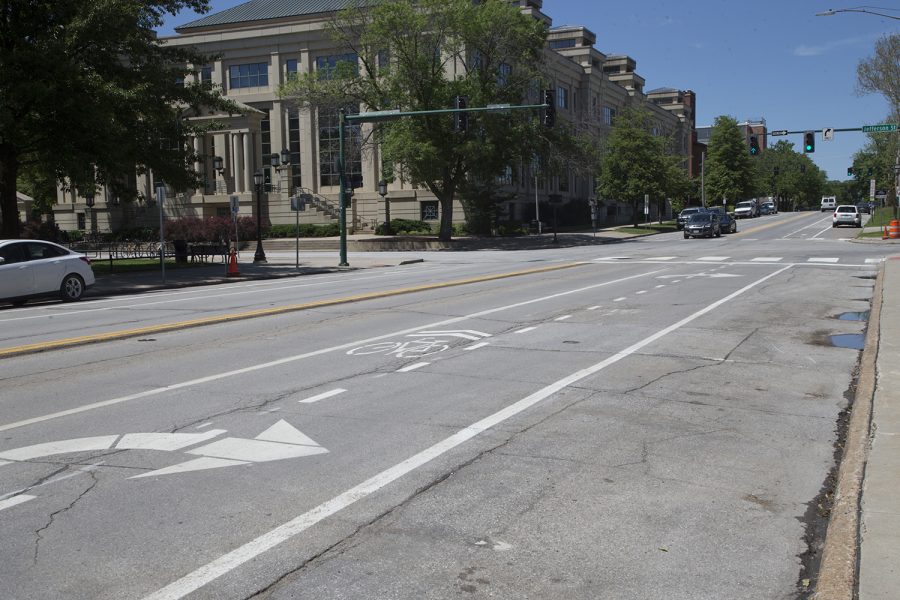Opinion: Iowa City needs more parking, not less
Eliminating parking spaces to make room for bike lanes isn’t the best move anyone.
Bike lanes are seen painted on Clinton St. in downtown Iowa City on Wednesday, June 5, 2019.
August 26, 2019
Anyone who has lived in the central Iowa City area has most likely noticed the lack of parking. With high demand and limited resources, almost every Tippie professor would agree that parking is a coveted asset. As more and more high-rise apartments join our central landscape, our little parking problem continues to flourish.
On Aug. 7, Iowa City residents poured into City Hall to discuss adding bike lanes to Dodge and Governor Streets between Burlington and Bowery. The community discussed the pros and cons that came along with eliminating 80 parking spaces, which is part of the city’s larger Bicycle Master Plan. Many perspectives, ideas, and opinions were shared during the meeting, which ultimately led city senior engineer Jason Reichart, who was involved in organizing the event, to conclude that there was a lot of work to be done before bringing a plan to the City Council.
Most people, including me, would agree that creating a more sustainable Iowa City would be an amazing thing. We must do so in a cognizant way. Eliminating 80 parking spaces from an already limited number without any sort of remedy other than “bring your bike instead of your car to school this year” is nonsensical.
As I mentioned earlier, parking in Iowa City is scarce. Many students find themselves paying anywhere between $50 to $200 a month just to park their cars. In order to save money, many will purposefully select apartments where free street parking is available. Further limiting this option exacerbates both the city’s affordable housing and parking issues.
Not to be dramatic, but this very well could be the straw that breaks the camel’s back.
Eliminating 80 parking spaces from an already limited number without any sort of remedy other than ‘bring your bike instead of your car to school this year’ is nonsensical.
Alternative to having a car, one could decide to walk. Iowa City is not walkable in all circumstances. Let’s remember the temperature here fluctuates between more than 100 and below zero degrees. Subzero temperatures often linger for months on end, which make walking difficult at best and unsafe at worst.
Not to fear, Iowa City public transit is here to save the day, right? Well, yes, unless it’s Sunday. That’s right, everyone, the Iowa City buses do not operate on Sundays, which means if you are looking to leave your apartment and travel anywhere outside of the campus area on that frigid Sunday morning, good luck.
We all want a more sustainable Iowa City. Currently many cyclists are forced to bike in lanes designed for vehicular traffic. Admittedly, I am not an avid cyclist. In fact, my freshman year I brought my bike from home and left it parked in Slater’s bike rack for the entire year. I did this for two main reasons: First, I am terrible at directions, and I was afraid I would consistently get lost navigating the city on my bike; second, I feared biking among the cars. Ultimately, I decided biking on or near campus just wasn’t for me. Had there been more bike lanes at the time, who knows? Maybe I would sign up for RAGBRAI next year.
Creating more bike lanes would encourage more Iowa Citians to cycle instead of drive. But to say it would completely eliminate the need for 80 parking spaces used by students and Iowa City residents is extremely altruistic and most likely incorrect. Iowa City’s limited public-transportation system does not easily allow people to completely phase out their personal vehicle use. Therefore, students affected by the elimination of the parking spots will be forced to find new places to park their cars.
Luckily, Iowa City is filled with many capable people who will continue to guide us to a more sustainable future. I hope we do so with urgency in a way that is sensible, reasonable, and affordable.
Columns reflect the opinions of the authors and are not necessarily those of the Editorial Board, The Daily Iowan, or other organizations in which the author may be involved.
















